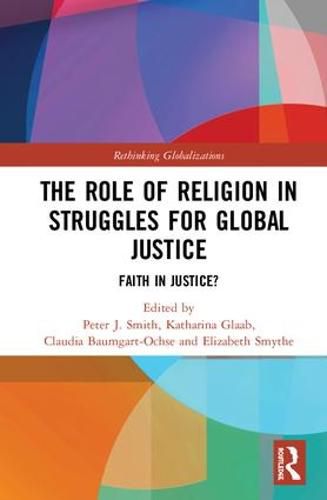Readings Newsletter
Become a Readings Member to make your shopping experience even easier.
Sign in or sign up for free!
You’re not far away from qualifying for FREE standard shipping within Australia
You’ve qualified for FREE standard shipping within Australia
The cart is loading…






Struggles for global justice are being fought by civil society groups across the globe, addressing global inequalities, challenging neoliberal market driven globalization and demanding to remedy its negative implications. This book examines the roles religious communities and organizations in particular play in the struggles for global justice, roles too often ignored by scholars of the Global Justice Movement (GJM). It has two central themes:
the role religion and religious actors play in global justice struggles, and
the idea that justice is a contested concept among both religious and secular actors which requires some sort of ‘faith’ from its proponents.
These chapters transcend simplistic either/or binaries highlighting the difficulties of clearly distinguishing between religious and secular, progressive and conservative, or rational and irrational motives and norms in struggles for justice. Challenging the secularization paradigm that marginalizes the role religious actors play in public life these chapters show how these actors engage with a broad range of justice issues, how deeply contested justice is, and how its meaning may vary and change among religious actors as a result of the social or political context within which an injustice is encountered.
The chapters originally published as a special issue in Globalizations.
$9.00 standard shipping within Australia
FREE standard shipping within Australia for orders over $100.00
Express & International shipping calculated at checkout
Struggles for global justice are being fought by civil society groups across the globe, addressing global inequalities, challenging neoliberal market driven globalization and demanding to remedy its negative implications. This book examines the roles religious communities and organizations in particular play in the struggles for global justice, roles too often ignored by scholars of the Global Justice Movement (GJM). It has two central themes:
the role religion and religious actors play in global justice struggles, and
the idea that justice is a contested concept among both religious and secular actors which requires some sort of ‘faith’ from its proponents.
These chapters transcend simplistic either/or binaries highlighting the difficulties of clearly distinguishing between religious and secular, progressive and conservative, or rational and irrational motives and norms in struggles for justice. Challenging the secularization paradigm that marginalizes the role religious actors play in public life these chapters show how these actors engage with a broad range of justice issues, how deeply contested justice is, and how its meaning may vary and change among religious actors as a result of the social or political context within which an injustice is encountered.
The chapters originally published as a special issue in Globalizations.